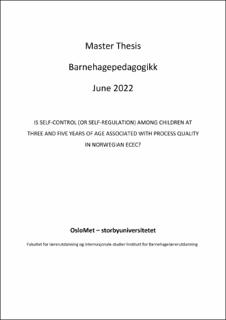Is self-control (or self-regulation) among children at three and five years of age associated with process quality in Norwegian ECEC?
Master thesis
Published version
Permanent lenke
https://hdl.handle.net/11250/3029408Utgivelsesdato
2022Metadata
Vis full innførselSamlinger
Sammendrag
In this study the association between process quality and the development of self-control among children from age 3 to age 5 in Norwegian Early Childhood Education and Care (ECEC) was investigated. Specifically, associations between interaction quality, measured with the Caregiver Interaction Profile (CIP), and self-control, assessed with the self-control subset in the Lamer Social Competence in Preschool Scale (LSCIP), was investigated. Caretaker-child attachment and relationships is thought to influence social-emotional and cognitive development among children, especially for children at risk. Children at risk are typically children with increased likelihood of low-level regulatory ability. However, the specifics of the associations between process quality and socio-emotional development among children are not obvious. This study aimed to add to the understanding of how different aspects of caretaker-child relationships might contribute to socio-emotional and cognitive development among children, in the Norwegian ECEC tradition. The results showed that interaction quality was not associated with self-control development among children at 3 and 5 years-of age. Self-control at age 3 and 5, assessed with LSCIP, seems not to be associated with ECEC interaction quality measured with CIP, in a Norwegian sample.
